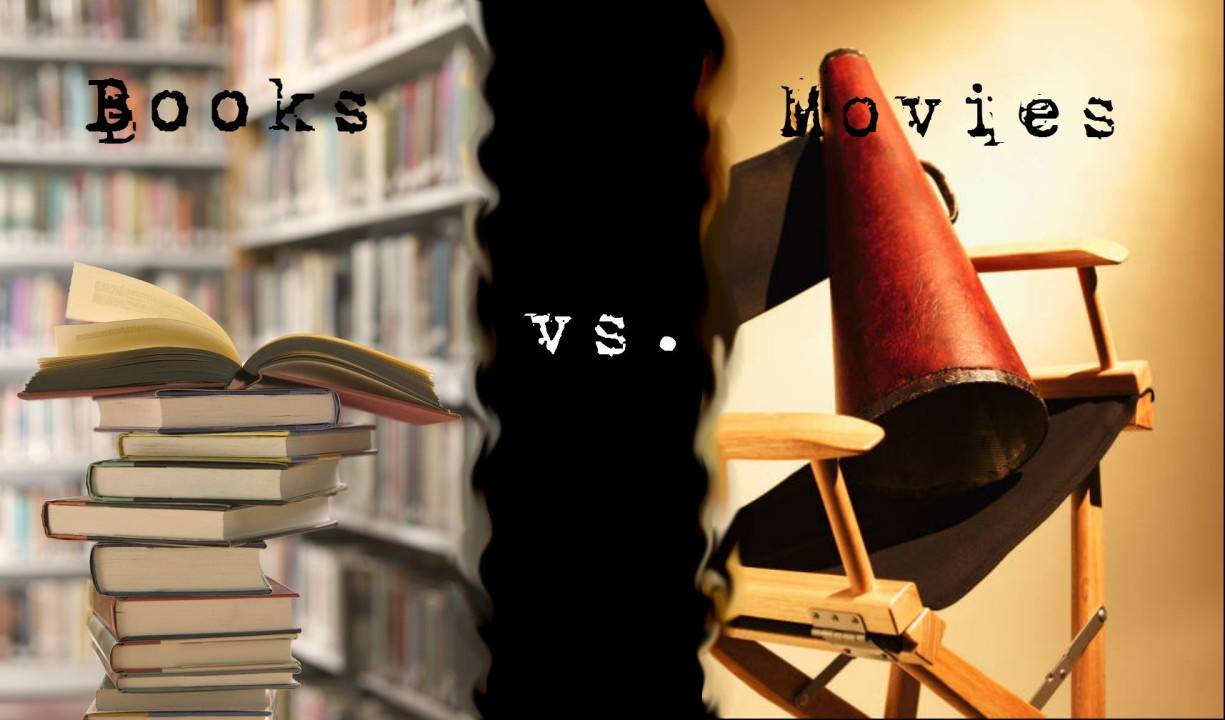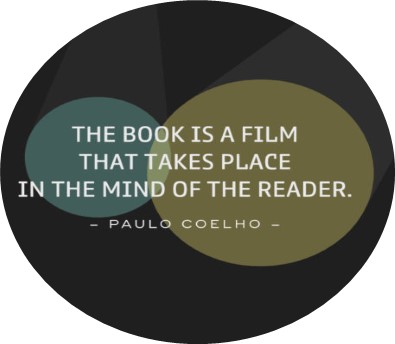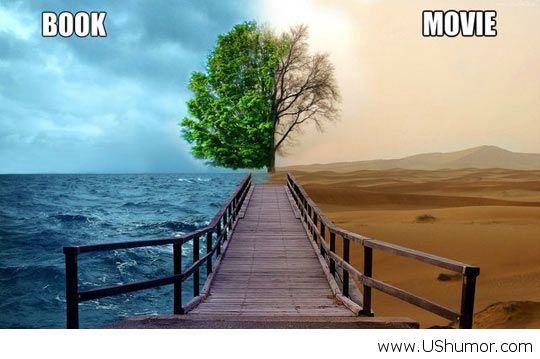Reading Books Vs Watching Movies
When it comes to reading books vs watching movies, each offers unique benefits and experiences. Reading books immerses you in vivid imagination and enhances critical thinking skills, while watching movies delivers visual storytelling and entertainment value.
Both mediums cater to different preferences and provide various ways to consume content based on personal preferences and time constraints. Whether it’s diving into a captivating novel or enjoying a blockbuster film, individuals have the opportunity to explore diverse narratives and genres through books and movies.
While some may prefer the tactile experience of flipping through pages, others may find enjoyment in the cinematic presentation of stories on screen. Understanding the differences and advantages of reading books and watching movies can help individuals make informed choices on how to engage with different forms of storytelling.

Credit: www.linkedin.com
Imagination And Creativity
When it comes to the debate of reading books versus watching movies, one of the key aspects to consider is the impact on imagination and creativity. Both mediums have their own unique ways of engaging the mind, but they do so in different ways. Let’s explore how reading books expands the mind and how visualizing characters in movies can spark creativity.
Expanding The Mind
Reading books is like taking the mind on a magical journey. As readers delve into the pages, their imagination takes flight, creating vivid mental images of the story unfolding. The descriptive language used in books allows readers to visualize scenes, characters, and settings based on their own interpretations, fostering a sense of personal connection. Unlike movies, books provide the freedom to imagine the tiniest details, allowing the mind to explore uncharted territories and expand imaginative capabilities.
Visualizing Characters
Movies, on the other hand, offer a visual representation of characters that can inspire creativity in unique ways. Through the use of costumes, makeup, and acting, the characters come to life on the screen. This visual stimulus can spark ideas and inspiration for artists, filmmakers, and even writers. By seeing the characters portrayed by actors, viewers can gather a different perspective and develop their own artistic interpretations, exploring new avenues of creativity.
In addition, movies utilize cinematography, special effects, and soundtracks to create immersive experiences. These elements can evoke strong emotions and further enhance the visual storytelling, providing viewers with a multisensory experience they can draw inspiration from.
In conclusion, both reading books and watching movies have their own merits when it comes to imagination and creativity. Books allow for boundless imagination and personal connection to the story, while movies provide visual stimuli that can inspire new creative paths. Ultimately, the choice between the two depends on individual preferences and the desired mental stimulation. Whichever medium is chosen, the journey of imagination and creativity awaits.
Engagement And Immersion
Engagement and immersion are critical aspects that draw us into the worlds of literature and film. Both mediums offer unique experiences that captivate audiences in different ways. Understanding the nuances of engagement and immersion can provide insight into how each medium connects with its audience.
Active Mental Participation
When reading a book, engagement requires active mental participation. Readers are tasked with interpreting the author’s words, creating visual imagery, and piecing together the narrative within their minds. This level of engagement encourages critical thinking and cognitive processing, as readers mentally engage with the material presented.
Being Transported Into A Story
One of the unique benefits of reading books is the capacity for being transported into a story. Through descriptive language and intricate details, books have the power to envelop readers in rich, imaginative worlds. This immersion allows readers to experience the story on a deeply personal level, forging a profound connection with the narrative.
Depth And Detail
When it comes to comparing the experience of reading books and watching movies, depth and detail are critical aspects that distinguish the two mediums. Both offer unique opportunities for exploring narrative intricacies, but they do so in distinct ways.
In-depth Character Development
One of the most significant advantages of books over movies lies in the in-depth character development they offer. Through prose, authors can delve deep into a character’s thoughts, motivations, and emotions, providing readers with a profound understanding of their inner worlds. This level of detail allows readers to form strong connections with the characters, making their journeys more immersive and impactful compared to what is typically portrayed on the screen.
Rich Descriptions Of Settings
Another area where books excel is in their ability to provide rich descriptions of settings. Authors can intricately weave details about the environment, creating vivid and evocative imagery in the reader’s mind. From the bustling streets of a city to the serene tranquility of a remote mountain town, the layers of description in books enable readers to fully immerse themselves in the worlds being depicted. This level of detail often surpasses what can be captured visually in a movie, allowing for a more personalized and imaginative experience.
Personal Interpretation
The beauty of reading books and watching movies lies in the personal interpretation of the story. Each individual perceives and understands the content through their own unique lens, influenced by their experiences, emotions, and imagination. This subjective perception adds depth and richness to the overall reading or viewing experience.
Reading books allows readers to actively engage with the text, enabling them to create vivid mental images and draw nuanced meanings from the words on the page. The absence of visuals in books provides readers with the opportunity to craft their own visual interpretations, leaving room for imagination and creativity.
On the other hand, watching movies offers a different yet equally powerful experience. Through cinematic techniques such as cinematography, editing, and sound design, filmmakers visually portray the story, influencing the viewer’s perception and invoking emotional responses. While movies provide a more explicit visual representation, they still leave space for individual interpretations.
It is important to note that personal interpretations of books and movies can differ significantly from the author’s or director’s intended meaning. This divergence stems from individuals’ unique backgrounds, cultural influences, and personal perspectives. Each person brings a distinct set of values and beliefs to their interpretation, giving rise to a diverse range of meanings derived from the same piece of content.
For instance, a person reading a book about love and loss may find solace in the protagonist’s journey and interpret the story as a tale of resilience and personal growth. On the other hand, someone watching a movie with the same theme may perceive it as a tragic portrayal of the devastating impact of love. This divergence in interpretation is a testament to the power of subjective perception.
In conclusion, personal interpretation plays a vital role in both reading books and watching movies. It allows individuals to connect with the content on a deeper level, creating their own unique meanings and exploring different facets of the story. Whether it be through the written word or visual representation, the beauty of personal interpretation lies in its ability to make each experience one-of-a-kind.
Convenience And Accessibility
Reading books and watching movies both offer convenience and accessibility for entertainment. Whether you prefer the immersion of a book or the visual experience of a film, both options cater to different preferences, ensuring everyone can enjoy their preferred mode of storytelling.
Easily Accessible Entertainment
In today’s fast-paced world, convenience and accessibility play a vital role in our everyday lives. Whether it’s entertainment or leisure activities, we tend to gravitate towards options that are easily accessible. When it comes to satisfying our entertainment needs, reading books and watching movies both offer unique experiences. However, their convenience and accessibility factors differ significantly. Let’s explore how these two mediums stack up against each other.Flexible Consumption Options
Books and movies provide different forms of entertainment, each with its own set of advantages. When it comes to reading books, they offer a flexible consumption option. Whether you prefer flipping through physical pages or indulging in e-books, books provide a sense of accessibility that can be tailored to individual preferences. With a wide array of genres and authors to choose from, books allow readers to immerse themselves in captivating stories at their own pace and convenience. On the other hand, movies offer a different kind of entertainment, one that appeals to our visual and auditory senses. With technological advancements, movies can be watched in various formats, such as theaters, DVDs, streaming platforms, or even on mobile devices. This flexibility in consumption options allows movie enthusiasts to enjoy their favorite films wherever and whenever they please, whether on a big screen or during a leisurely commute. However, it’s important to note that while movies can be easily accessed through different mediums, they often come with limitations, such as release dates and subscription costs. In contrast, books offer a more affordable option, with libraries, bookstores, and online platforms providing a multitude of choices without the need for a subscription. Whether you prefer the tangible feel of a book or the convenience of an e-reader, books can be easily accessed and enjoyed without hefty expenses. In summary, when it comes to convenience and accessibility, both books and movies have their unique advantages. Books offer a flexible consumption option while movies provide a visually captivating experience. Whether you choose to immerse yourself in the pages of a book or lose yourself in the magic of cinema, both mediums offer easily accessible entertainment options to cater to your interests and preferences. So, get ready to embark on a journey filled with imagination and escapism, be it through the written word or the silver screen.
Credit: blogs.libraries.indiana.edu

Credit: creativecommunityreview.wordpress.com
Frequently Asked Questions For Reading Books Vs Watching Movies
Is It Better To Read Books Or Watch Movies?
Both reading books and watching movies have their own benefits. It depends on individual preference and the desire for visual or imaginative experiences.
What Are The Advantages Of Reading Books Over Watching Movies?
Reading books allows for a deeper exploration of characters and storylines, stimulates imagination, and helps improve language and critical thinking skills.
What Makes Watching Movies A Captivating Experience?
Movies provide visual and auditory stimulation, bringing stories to life with actors, special effects, and music. They offer a shared cinematic experience and can be more time-efficient.
Conclusion
Books and movies both offer unique experiences, but they cater to different preferences. While books allow readers to immerse themselves in the story and engage their imagination, movies provide a visual representation and can be enjoyed by a wider audience.
Ultimately, the choice between reading books and watching movies depends on individual preferences and circumstances. Whether you prefer the quiet solitude of reading or the visual appeal of movies, both mediums have their own merits and can provide hours of entertainment and enlightenment.
So, pick up a book or grab some popcorn and enjoy the experience!





